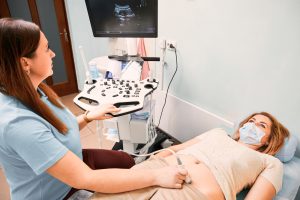Nurses play a pivotal role in healthcare, not only through direct patient care but also by educating patients and the community about health management. This education process is crucial for empowering individuals to take charge of their health, understand their medical conditions, and navigate the healthcare system effectively. By providing tailored education, nurses can foster better health outcomes and support patients in making informed decisions about their care. Nurse Patient Educators educate patients about health conditions, recovery, medication and rehab but they also serve as educators of the community on health promotion issues and disease education. They serve their hospital as a communicator to staff and the community on multitude of health issues. Please also review AIHCP’s Nurse Patient Educator Program.

Key Takeaways
- Nurses are integral to patient education, helping individuals understand their diagnoses, treatment options, and recovery processes.
- Effective patient education requires strategies that consider cultural competence, health literacy, and the specific needs of diverse patient populations.
- Community outreach and health promotion initiatives led by nurses can significantly improve public health and resource accessibility.
- Empowering patients with the knowledge and skills to manage their health, including self-care and disease management, is a critical aspect of nursing.
- Nurses play a key role in addressing the health risks associated with sedentary lifestyles and integrating social determinants into patient care.
The Role of Nurses in Patient Education
Understanding Patient Diagnoses
Nurses play a pivotal role in the initial stages of patient care, which involves a thorough understanding of patient diagnoses. The assessment of a patient’s readiness to learn is crucial, as it determines the approach a nurse will take in educating the patient about their condition. This readiness is gauged by evaluating the patient’s interest, emotional status, and mental capacity.
A comprehensive review of the patient’s medical history is essential. Nurses meticulously examine patient records, inquire about recent changes in health status, and consider any alterations in long-term medical conditions. They also ensure that all symptoms are accounted for, even those that patients may deem insignificant, as these can be indicative of underlying issues.
Diagnostic testing forms a significant component of understanding patient diagnoses. Nurses may suggest and administer tests relevant to the symptoms presented, ensuring a precise and timely diagnosis.
Patient education extends beyond diagnosis to encompass treatment options and discharge instructions. Nurses empower patients by providing them with the knowledge and skills necessary to manage their conditions effectively and maintain long-term health.
Explaining Treatment Options
Nurses play a pivotal role in explaining treatment options to patients, ensuring they are well-informed and able to participate actively in their own care. This process involves a clear communication of the potential benefits, risks, and alternatives of various treatments. Nurses must be adept at translating complex medical information into understandable terms for patients, taking into account their individual needs and preferences.
- Assess the patient’s understanding of their condition
- Present the treatment options available
- Discuss the benefits and risks associated with each option
- Consider the patient’s lifestyle, values, and beliefs in the decision-making process
It is essential for nurses to foster an environment where patients feel comfortable asking questions and expressing concerns. This open dialogue supports shared decision-making and enhances patient satisfaction with their care.
By leveraging clinical decision support tools and staying abreast of the latest evidence-based practices, nurses can provide personalized care that aligns with the best interests of their patients. Addressing the patient’s learning style is crucial to ensure the information is retained and applied effectively, ultimately leading to better health outcomes.
Guiding Discharge and Home Recovery
Upon discharge, nurses play a pivotal role in ensuring that patients and their families are equipped with the necessary knowledge and skills for successful home recovery. High-quality discharge teaching is crucial as it enables patients to continue their rehabilitation and reduces the likelihood of readmission. Nurses must provide clear instructions on wound care, medication administration, and the monitoring of potential complications.

Effective discharge planning involves a comprehensive approach that addresses the social and economic challenges patients may face. It is essential for nurses to empower patients and their families by providing evidence-based education and resources tailored to their specific needs. This support is particularly important for vulnerable populations, such as postpartum women and children, who may require additional guidance during the transition from hospital to home.
Nurses also have the responsibility to educate family caregivers on the proper setup and use of medical equipment and to offer emotional support throughout the recovery process. The goal is to foster a culture of empowerment, where patients feel confident in managing their health post-discharge.
Educational Strategies for Diverse Patient Populations
Tailoring Education to Patient Conditions
In the realm of patient education, nurses play a pivotal role in ensuring that information and guidance are not only accessible but also personalized to meet the unique needs of each patient. Effective patient education is characterized by the ability to adapt teaching methods to the individual’s condition, thereby enhancing their understanding and engagement in their own care. Tailoring education to patient conditions involves a multifaceted approach that includes assessing the patient’s knowledge level, cultural background, and preferred learning style.
To achieve this, nurses may employ a variety of strategies, such as:
- Utilizing patient-centered teaching tools
- Implementing remote patient monitoring for continuous education
- Leveraging virtual translation services to overcome language barriers
The essence of personalized patient education lies in the creation of a supportive environment that encourages active participation and fosters a sense of empowerment among patients.
By integrating these strategies, nurses can address the diverse needs of patients, ensuring that each individual receives the most effective and comprehensible education possible. This is particularly crucial when dealing with complex conditions where understanding and adherence to treatment plans can significantly impact patient outcomes.
Cultural Competence in Patient Instruction
In the realm of patient education, cultural competence is paramount for nurses to effectively communicate and educate diverse patient populations. It involves more than just language translation; it requires an understanding of cultural practices, beliefs, and values that influence health behaviors and perceptions. Nurses must be adept at recognizing these cultural nuances to tailor their educational approach accordingly.
- Recognize and respect cultural differences
- Understand cultural influences on health behaviors
- Tailor educational materials to cultural needs
Nurses play a critical role in bridging the cultural divide in healthcare settings, ensuring that patient instruction is not only informative but also culturally sensitive.
By integrating cultural competence into patient education, nurses contribute to better health outcomes and patient satisfaction. This approach fosters an environment of trust and respect, which is essential for effective patient-nurse interactions.
Addressing Health Literacy Variations
Health literacy is a pivotal component of effective patient education, influencing a patient’s ability to understand and act upon health information. Nurses play a crucial role in addressing health literacy variations to ensure that all patients, regardless of their educational background, have the necessary knowledge to make informed decisions about their health.
To bridge the gap in health care access, nurses must tailor their communication strategies to the individual’s level of comprehension. This may involve simplifying medical jargon, using visual aids, or providing written materials at an appropriate reading level.
- Assess the patient’s baseline understanding of their health condition.
- Utilize teach-back methods to confirm comprehension.
- Offer resources in multiple languages if needed.
- Follow up to reinforce learning and address any questions.
By proactively identifying and mitigating barriers to comprehension, nurses can enhance patient engagement and foster better health outcomes.
It is essential to create an inclusive environment that considers factors such as language, culture, and socioeconomic status. This approach not only empowers patients but also contributes to the equity of health care delivery.
Community Outreach and Health Promotion
Organizing Community Health Resources
Nurses play a pivotal role in organizing community health resources to ensure that individuals have access to necessary care and support. By bridging the gap in health care access, nurses work to connect individuals with quality, affordable care, taking into account factors such as language, transportation, and cultural sensitivity.

- Explore partnerships with communities to identify barriers to health care.
- Connect individuals with quality, affordable care considering language and transportation.
- Ensure cultural sensitivity in the provision of health services.
Nurses are instrumental in creating a comprehensive directory of local community services, making it easier for patients and the public to find resources that address specific needs and social determinants of health.
Furthermore, nurses contribute to empowering health through community and equity by addressing broader social determinants and fostering an environment of inclusivity and opportunity. This approach is essential for enabling individuals and communities to achieve their full potential for health and well-being.
Developing Public Health Education Programs
In the realm of public health, nurses play a pivotal role in the development and implementation of education programs aimed at disease prevention and health promotion. Nurses are instrumental in crafting curricula that resonate with the community, ensuring that the content is not only informative but also accessible and engaging. These programs often focus on areas such as chronic disease management, nutrition, and physical activity, tailored to meet the specific needs of the population served.
Effective public health education programs are characterized by their ability to adapt to the evolving needs of the community. For instance, in rural areas, strategies may include mobile clinics and telehealth services to overcome geographical barriers. The following list outlines key components of successful programs:
- Assessment of community health needs
- Development of targeted educational materials
- Training of healthcare professionals to deliver the programs
- Evaluation of program outcomes to inform future initiatives
By integrating the social determinants of health and leveraging local resources, nurses can create programs that not only educate but also empower individuals to take charge of their health.
The impact of these programs is significant, as they equip individuals with the knowledge and skills necessary to make informed decisions about their health. This approach aligns with the broader goals of public health, which emphasize prevention over treatment and the importance of addressing health disparities.
Collaborating with Community Partners
Nurses play a pivotal role in bridging the gap in health care access by forming strategic alliances with community partners. These collaborations are essential for identifying barriers to care and connecting individuals with quality, affordable services. By engaging with a diverse range of partners, nurses can leverage a broad array of expertise and perspectives, which is crucial for building stronger, more resilient health systems.
Effective collaboration often involves:
- Innovating clinical models to enhance patient care.
- Improving documentation practices for better health outcomes.
- Advancing technology to meet the current healthcare demands.
- Ensuring workplace readiness to address the provider shortage.
Nurses’ partnerships with local healthcare employers often result in significant innovations, such as the development of new clinical models and the advancement of healthcare technology. These initiatives not only improve patient care but also contribute to the readiness of the workplace to meet emerging health challenges.
In the context of community outreach, nurses also play a vital role in fostering an environment of inclusivity and opportunity. This holistic approach empowers individuals and communities to achieve their full potential for health and well-being.
Empowering Patients through Knowledge and Skills
Teaching Self-Care and Disease Management
Nurses play a pivotal role in teaching patients the essential skills for self-care and effective disease management. Empowering patients with the knowledge to manage their conditions can significantly improve their quality of life and reduce the need for acute medical interventions. This education includes guidance on monitoring symptoms, understanding medication regimens, and recognizing when to seek further medical assistance.

Effective self-care education often involves a step-by-step approach to ensure comprehension and adherence. For instance:
- Monitoring vital signs and symptoms
- Administering medications correctly
- Understanding dietary and lifestyle modifications
- Utilizing medical equipment, such as glucose monitors or blood pressure cuffs
Nurses must tailor these educational efforts to the individual’s health literacy level, ensuring that all patients, regardless of their background, can benefit from the knowledge imparted.
In chronic disease management, family involvement is crucial. Nurses educate family members on how to support the patient’s self-care routine, fostering a collaborative environment for ongoing disease management. This includes background knowledge of self-care, which is a powerful concept in the context of health and particularly nursing.
Demonstrating Wound Care and Medication Administration
Nurses play a pivotal role in ensuring that patients and their caregivers are adept at managing wound care and medication administration post-discharge. Proper education on these tasks is crucial for patient recovery and independence. Nurses provide comprehensive demonstrations on wound care techniques, emphasizing the importance of cleanliness, proper dressing changes, and monitoring for signs of infection.
For medication administration, nurses ensure that patients understand dosages, timing, and potential side effects. An organized medication system is vital for preventing adverse effects and promoting health. The use of electronic Medication Administration Records (eMARs) has become a standard practice, allowing for accurate tracking and management of a patient’s medication regimen.
Providing patient and caregiver education is essential. Verbal, demonstrated, and written instructions optimize the learning process and support ongoing evaluation of the patient’s condition.
The benefits of effective wound care and medication management education include improved patient adherence to treatment plans, reduced complications, and a decrease in healthcare costs due to preventable errors. Nurses must tailor their educational approach to each patient’s needs, ensuring that both the patient and their caregivers are confident in their ability to manage care at home.
Supporting Family Caregivers in Patient Care
Nurses play a pivotal role in educating and supporting family caregivers, who are often the primary source of patient care outside the hospital setting. Family caregivers provide a range of services from monitoring the patient’s condition to administering medications and setting up medical equipment. It is essential for nurses to equip these caregivers with the necessary knowledge and skills to perform these tasks effectively.
The relational aspect of nursing extends to family caregivers, emphasizing the importance of empathy, compassion, and kindness in communication. Nurses must not only convey critical information but also provide emotional support, helping to sustain the caregiver’s well-being alongside the patient’s health.
To facilitate this support, nurses can utilize various resources and programs designed to assist family caregivers. These may include:
- On-site resources such as child care during medical appointments
- Financial aid programs and insurance coverage assistance
- Educational materials on managing specific medical equipment
- Support services and professional training programs
The 2022 National Strategy to Support Family Caregivers recognizes the diverse needs of caregivers across all ages and circumstances. Nurses are encouraged to familiarize themselves with such strategies to enhance the support provided to family caregivers.
In healthcare and nursing, relationships matter. The warmth generated in the nurse-patient relationship extends to interactions with family caregivers, reinforcing the significance of relational nursing in patient care.
Nurses’ Role in Reducing Sedentary Lifestyles
Assessing Risks of Prolonged Inactivity
The assessment of risks associated with prolonged inactivity is a critical component of nursing care. Nurses play a pivotal role in identifying the potential health hazards that come with excessive sedentary behavior. It is essential to recognize that even individuals who meet physical activity guidelines can be at risk if they engage in high-volume sitting or long periods without breaks.
Nurses’ role in educating patients to reduce health risks of prolonged inactivity is becoming increasingly important. They are tasked with not only identifying the risks but also providing actionable strategies to mitigate them.
Interventions to reduce sedentary time can include structured suggestions such as the use of standing desks, implementation of walking or standing breaks, and leveraging technology with reminders for physical activity. Understanding the individual and environmental factors that contribute to sedentary behavior is crucial in tailoring these interventions effectively.
- Assess total daily sitting time
- Identify individual and environmental factors contributing to sedentary behavior
- Suggest interventions like standing desks and walking breaks
- Use technology to remind patients to move
By actively engaging in this educational process, nurses can help patients balance sedentary behavior with physical activity, ultimately contributing to better health outcomes.
Encouraging Physical Activity and Movement Breaks
In the modern healthcare setting, nurses play a pivotal role in promoting physical activity among patients. This involves not only structured exercise programs but also integrating movement breaks into daily routines. Nurses can guide patients in understanding the importance of breaking up prolonged periods of inactivity, which is known to increase health risks even for those who engage in regular physical activity.
To effectively encourage movement breaks, nurses can suggest practical interventions such as the use of standing desks or implementing frequent walking or standing breaks. Additionally, leveraging technology with computer or smartphone reminders can assist patients in incorporating brief physical activity breaks throughout their day.
Nurses’ advocacy for physical activity is crucial in combating the health risks associated with sedentary lifestyles. By educating patients on the benefits of movement breaks, nurses contribute to a holistic approach to health promotion.
The table below outlines simple strategies that nurses can recommend to patients to reduce sedentary behavior:
| Strategy | Description |
|---|---|
| Standing Desks | Encourage alternating between sitting and standing while working. |
| Movement Alarms | Set regular alarms as reminders to stand or walk. |
| Walking Meetings | Suggest walking while discussing or consulting, when possible. |
| Stretching Breaks | Introduce short stretching routines to perform during breaks. |
Understanding Environmental Factors Influencing Sedentary Behavior
Nurses play a crucial role in addressing the health risks associated with prolonged sedentary behavior. It is essential to evaluate the total daily sitting time and understand the multifaceted factors that contribute to it. These factors can be individual, social, occupational, or community-based and environmental. By recognizing these elements, nurses can tailor interventions to reduce and interrupt sitting times effectively.
Nurses can actively encourage patients to balance sedentary behavior with physical activity by taking more frequent standing or walking breaks.
Interventions proposed to mitigate sedentary lifestyles include the use of standing desks, frequent walking or standing breaks, and technological reminders for brief physical activity. While promoting regular physical activity remains important, the focus also shifts to reducing uninterrupted sitting time. The table below outlines some key interventions and their objectives:
| Intervention | Objective |
|---|---|
| Standing Desk | Reduce sitting time during work |
| Walking Breaks | Interrupt prolonged sitting |
| Technological Reminders | Encourage regular activity |
Further research is needed to determine the most effective strategies for reducing habitual sitting. However, the current evidence underscores the importance of nurses’ involvement in educating patients about the health risks of sedentary behavior and the simple changes that can be made to improve health outcomes.
Integrating Social Determinants of Health in Nursing Care
Assessing Social and Economic Factors
Nurses play a pivotal role in recognizing the social and economic factors that influence patient health outcomes. By assessing these determinants, they can tailor interventions to address the specific needs of their patients. For instance, understanding a patient’s access to transportation, stable housing, and nutritious food can inform a more comprehensive care plan.

Incorporating an assessment of social determinants into nursing care requires a systematic approach. Nurses may consider factors such as employment status, education level, and social support networks. These assessments can be structured as follows:
- Evaluation of financial stability and resources
- Determination of educational attainment and literacy
- Analysis of social connections and community engagement
The association between knowledge of health economics and socio-economic demographics is significant. A study titled ‘Assessment of Knowledge of Health Economics among Healthcare …’ found a correlation between optimal knowledge and various socio-economic and demographic factors. This underscores the importance of integrating health economics into nursing education to better equip nurses for comprehensive patient care.
By addressing social determinants, nurses not only improve individual patient care but also contribute to the broader goal of health equity and the reduction of disparities within the community.
Incorporating Community Health Needs into Care Plans
In the pursuit of holistic patient care, nurses must integrate community health needs into individual care plans. This approach acknowledges that a patient’s health is influenced by a myriad of social determinants beyond the clinical setting. Nurses are pivotal in identifying these factors and tailoring care to address them.
- Assessing the availability of local health resources
- Understanding cultural and linguistic barriers
- Recognizing economic and transportation limitations
By considering these elements, nurses can develop care plans that are not only medically sound but also socially aware and practical within the patient’s community context.
Nurses’ ability to incorporate community health needs into care plans is essential for fostering an environment that supports health and well-being. It empowers individuals to overcome barriers to care and promotes health equity.
The inclusion of community health needs into care plans is not just a theoretical exercise; it has practical implications for patient outcomes. For instance, a care plan that includes a referral to a local food bank for a patient with food insecurity or a transportation service for a patient without reliable access to medical appointments can make a significant difference in their health journey.
The Impact of Nursing Professional Practice Models
Promoting Patient-Centered Outcomes
In the pursuit of excellence in healthcare, nurses play a pivotal role in steering the focus towards patient-centered outcomes. Shared governance and accountability are fundamental in this endeavor, ensuring that decisions made at various levels of nursing practice are aligned with the goal of enhancing patient care. The implementation of nursing councils and systems of shared governance act as the backbone for continuous evaluation and improvement of care processes.
- Nursing councils establish methodologies for decisions in professional practice, education, and resource allocation.
- Shared governance provides checks and balances to evaluate care effectiveness.
By fostering an environment where nurses are empowered to make decisions, patient outcomes are not only improved but also tailored to meet the unique needs of each individual.
Critical thinking and confidence are nurtured within nursing professionals, enabling them to address complex healthcare challenges effectively. This approach not only improves patient use and administration of medications but also contributes to a higher percentage of patients meeting their healthcare goals, thereby reducing medical costs and emergency room visits.
Empowering Nurses in Care Coordination
Nurses play a pivotal role in care coordination, which is essential for delivering high-quality, patient-centered healthcare. Empowering nurses within this domain not only enhances patient care but also contributes to the professional development of nurses. Through a system of shared governance, nurses are involved in decision-making processes that affect their practice and patient outcomes. This collaborative approach ensures that care is continuously evaluated and improved upon.

- Nursing councils establish methodologies for professional practice and strategic planning.
- Shared governance provides checks and balances for care processes.
- Structural empowerment measures and improves the quality of care.
The empowerment of nurses in care coordination services is a testament to their critical role in patient empowerment. By actively engaging patients, nurses facilitate a partnership that encourages patients to take charge of their health.
The culture of empowerment within nursing not only builds confidence and critical thinking skills but also addresses the provider shortage by preparing new nurses to speak up and advocate for quality care. This empowerment is evident in various aspects of nursing, from monitoring patient conditions to providing emotional support and educating family caregivers.
Fostering Interdisciplinary Collaboration
Interdisciplinary collaboration in nursing is pivotal for ensuring comprehensive patient care. Nurses play a crucial role in assembling and coordinating multidisciplinary teams that bring together various healthcare professionals with diverse expertise. These teams are essential for developing holistic care plans that address all aspects of a patient’s health.
Regular interdisciplinary meetings are a cornerstone of effective collaboration. During these sessions, team members can share insights, discuss patient progress, and adjust care strategies as needed. The following list outlines key components of successful interdisciplinary meetings:
- Clear communication channels among team members
- Regularly scheduled meetings to review patient cases
- Defined roles and responsibilities within the team
- Commitment to shared goals and patient-centered outcomes
By fostering an environment where knowledge and skills are shared openly, nurses contribute to a culture of continuous learning and improvement. This collaborative approach not only enhances patient care but also empowers healthcare professionals to implement innovative solutions to complex health challenges.
The impact of such collaboration extends beyond individual patient outcomes. It leads to the development of new clinical models and the refinement of existing practices. For instance, the integration of student nurses into team-based clinical models emphasizes the importance of multi-patient care and effective communication during patient handoffs. This not only prepares future nurses for the realities of healthcare teamwork but also strengthens the current workforce by introducing fresh perspectives and innovative approaches.
Advanced Practice Nursing and Patient Education
Conducting Comprehensive Patient Assessments
In the realm of advanced practice nursing, conducting comprehensive patient assessments is a cornerstone activity that sets the stage for effective patient care. Advanced practice registered nurses (APRNs) are equipped with the skills to perform physical exams, diagnose conditions, and develop or contribute to treatment plans. Their assessments are meticulous, encompassing a review of the patient’s medical history, recent changes in medications, and any alterations in long-term medical conditions.
The initial patient evaluation is critical as it informs the subsequent steps in care delivery, ensuring that each patient’s unique health needs are identified and addressed.
Physical examinations are tailored to the patient’s presenting issues, with nurses in emergency and urgent care settings often conducting focused assessments based on the patient’s condition. For example, a rash may necessitate a targeted skin examination. The following list outlines key components of a comprehensive patient assessment:
- Review of patient records and medical history
- Assessment of recent changes in health status
- Physical examination pertinent to the patient’s complaints
- Diagnostic testing as required
This thorough approach to patient assessment by APRNs is vital in crafting personalized care plans that are both effective and responsive to the patient’s specific health concerns.
Developing and Implementing Advanced Care Plans
Advanced practice nurses (APRNs) play a pivotal role in the development and implementation of advanced care plans (ACPs). These comprehensive plans are tailored to meet the intricate needs of patients with complex health conditions. The process involves a thorough assessment of the patient’s health status, including physical examinations, diagnosis, and collaboration with other healthcare professionals.
APRNs are instrumental in educating both patients and family caregivers on the nuances of the care plan. This education includes the administration of medications, the operation of medical equipment, and the provision of emotional support. By empowering nurses through an integrative nursing education plan for ACP, they are equipped to engage in vital conversations about the patient’s care trajectory.
The success of an ACP hinges on the collaborative efforts of the interdisciplinary team, ensuring that each aspect of the patient’s care is addressed. This collaborative approach reduces clinical variation and leverages clinical decision support to enhance patient outcomes.
In the context of oncology nursing, for example, the APRN’s responsibilities may extend to monitoring the patient’s condition, administering palliative medications, and setting up necessary medical equipment. The table below outlines key responsibilities of APRNs in the context of ACP:
| Responsibility | Description |
|---|---|
| Patient Assessment | Conduct physical exams and diagnose conditions. |
| Treatment Planning | Develop or contribute to treatment plans. |
| Collaboration | Work with clinicians and specialists. |
| Education | Provide patient and caregiver education. |
| Medication Administration | Administer treatments and medications. |
Ultimately, the integration of ACPs into nursing practice not only enhances patient care but also fosters the professional growth of nurses, building their confidence and critical thinking skills.
Educating Patients and Caregivers on Complex Treatments
Advanced practice nurses play a pivotal role in patient and caregiver education, particularly when it comes to complex treatments that require detailed understanding and precise management. The ability to convey intricate treatment information in an accessible manner is crucial for patient compliance and successful outcomes.
In the context of complex treatments, such as those for chronic conditions or cancer therapies, nurses must ensure that patients and their caregivers are well-informed about the regimen’s intricacies. This includes the purpose of the treatment, potential side effects, and the importance of adherence to the prescribed schedule.
- Explanation of the treatment’s purpose and expected outcomes
- Detailed instructions on medication administration
- Management of potential side effects
- Strategies for maintaining treatment schedules
Empowering patients and caregivers with knowledge not only enhances their ability to manage treatments but also fosters a sense of control over their health journey.
Nurses must also assess the educational needs of patients and caregivers, tailoring their approach to accommodate varying levels of health literacy. By doing so, they bridge the gap between complex medical protocols and patient-centered care, ensuring that each individual is equipped to navigate their treatment effectively.
At the forefront of healthcare, Advanced Practice Nursing plays a pivotal role in patient education, empowering individuals with the knowledge they need to manage their health effectively. Our Nurse-Patient Educator Certification program is designed to enhance the skills of nurses, equipping them with advanced teaching methodologies to improve patient outcomes. If you’re a healthcare professional committed to lifelong learning and growth, we invite you to explore our certification programs and join a community dedicated to excellence in healthcare practice. Visit our website to learn more and take the first step towards becoming a Certified Nurse-Patient Educator.
Conclusion

In conclusion, nurse patient education is an indispensable facet of healthcare that extends beyond the clinical setting into the heart of communities. Nurses play a pivotal role in bridging the gap between medical knowledge and patient understanding, empowering individuals to take charge of their health. Through a combination of empathy, clear communication, and tailored educational strategies, nurses can effectively guide patients and their families in managing conditions, navigating treatment options, and making informed decisions. Moreover, the integration of social determinants of health into patient education underscores the importance of a holistic approach to healthcare, one that acknowledges the broader social context influencing patient well-being. As advocates for health equity and community engagement, nurses are instrumental in fostering a culture of informed health choices and proactive wellness behaviors, ultimately contributing to the betterment of public health.
Please also review AIHCP’s Nurse Patient Education Certification and see if it meets your academic and professional goals. The program is online and independent study and open to nurses looking to enter into nurse patient education.
Frequently Asked Questions
What is the role of nurses in patient education?
Nurses play a crucial role in patient education by helping patients understand their diagnoses, treatment options, and discharge recommendations. They also demonstrate how to care for wounds and explain proper medication administration for recovery at home.
What does patient education entail?
Patient education involves informing and motivating patients to change their behaviors, improve knowledge and attitudes, and ultimately enhance their long-term health status. It includes information about patient conditions, treatments, and healthcare options.
How do nurses contribute to community health education?
Nurses contribute to community health by organizing health resources, developing public health education programs, and collaborating with community partners to empower health through community and equity.
What is the nurses’ role in reducing the risks of a sedentary lifestyle?
Nurses educate patients on the health risks of prolonged sedentary time and encourage physical activity and movement breaks. They assess individual, social, and environmental factors contributing to sedentary behavior and promote active living.
How do nurses address the social determinants of health in patient care?
Nurses assess social and economic factors affecting patients’ health, document them, and incorporate this information into treatment plans. They play a role in leading social change and understanding community health needs.
What is the Nursing Professional Practice Model?
The Nursing Professional Practice Model is a framework that promotes patient-centered outcomes and empowers nurses in care coordination. It emphasizes the relationship between nurses, patients, families, and communities, and the connection to proven outcomes.
What are the responsibilities of an advanced practice registered nurse (APRN) in patient education?
APRNs conduct comprehensive patient assessments, develop and implement advanced care plans, and educate patients and caregivers on complex treatments. They collaborate with other clinicians and operate medical equipment.
Why is empathy and communication important in nursing?
Empathy and effective communication are essential in nursing as they go beyond simply providing education. They involve creating a caring and compassionate environment for patients and their families, which is crucial for holistic care.
Additional Resources
“Nurses as educators within health systems”. Lori C. Marshall, Immacolata Dall’Oglio, David Davis, Gloria Verret, Tere Jones. (2020). Sigma. Access here
“Moving Into Action: The Master Key to Patient Education”. Zhila FEREIDOUNI, et al. (2019). J Nurs Res. 2019 Feb; 27(1): 1–8. National Library of Medicine. Access here
“10 Ways Nurses and Nurse Leaders Can Improve Patient Education”. Morris, G. (2022). Nurse Journal. Access here
“The experiences of nurse educators in implementing evidence-based practice in teaching and learning”. Gloria N. Mthiyane and Debbie S. Habedi. (2018). Health SA. 2018; 23: 1177. National Library of Medicine. Access here
“Empowering Patients: Promoting Patient Education and Health Literacy”. Pradnya Brijmohan Bhattad and Luigi Pacifico. (2022). Cureus. 2022 Jul; 14(7): e27336. National Library of Medicine. Access here

 Written by Veronica Turner
Written by Veronica Turner


 Written by Victoria Maxwell
Written by Victoria Maxwell Written by Veronica Turner
Written by Veronica Turner By Lucy Peters
By Lucy Peters